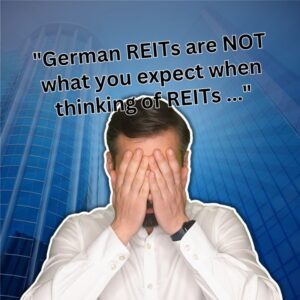Real Return of the German Real Estate Market
Everybody knows that real estate in Germany offered investors an incredible return over the last few years. But how good was it really? 🤔 That is what we are fact-checking in this article of the GermanReal.Estate Blog.
Key Takeaways
- The German Economic Institute published a study about the real return of the German real estate market.
- To calculate the return of German real estate two factors matter. The return on rent and the return on equity.
- The overall return of the German real estate market in the 21st century was pretty insane with growth rates of up to 12.3%.
- The return of the German real estate market in the 20th century was very volatile based on circumstances like the Iran-Iraq war.
- The German Institute of Economics believes that real estate in Germany is so resilient because of three different points.
The Real Return of the German Real Estate Market
Is German real estate in a bubble? Real estate prices in Germany have gone through the roof in the last few years. According to several mass media sources, we’re in a real estate bubble, and that bubble is about to burst! Really?
We’ve discussed the bubble argument and the future of the German real estate market in many videos already (like here, here, and here), so today we want to focus on the real return of German properties over the years. Is it as insane at the moment as everybody is saying? And not just over the last 10 years. In this article on the GermanReal.Estate blog, we’ll look back over the last 50 years as a comparison to the current market.
Real estate prices have risen in Germany in real terms almost every year. You too can participate in this with our Security tokens.
Return Calculation Of German Real Estate
In a recent study, the German Economic Institute looked at the real returns of the German real estate market since 1970. We’ll summarize their findings in this article, but you can download the full study here. The German Economic Institute calculated the total return of German Properties by adding the two factors that matter most when investing in real estate:
- Return on rent, which is calculated by dividing the yearly rental income by the purchasing price of the property to see how much passive income the property is creating, and
- Return on equity from the increase (or decrease) in property value.
Before we look at the charts, it’s important to understand that a positive total return does not mean a positive real-life return from your real estate investment. Why not? Imagine you invest in a property and get a 1% return on rent and a 1% increase in property value. This is low, way too low if we look at the findings of the study, but this example illustrates how even with a positive return, you probably wouldn’t make a positive real-life return.
As a real estate investor, you have to maintain and renovate your property. That costs money. You probably have a mortgage with an interest rate that increased significantly last year. That costs money. Finally, inflation is always a factor and has also increased significantly over the past year. This lowers your real-life return too. For this reason, Professor Voigtländer, who authored the study, is considering only a total return of at least 3% as a real-life positive investment return. Everything below 3% probably means you made a loss with your real estate investment.
Now, let’s take a look at the charts showing the real return of the German real estate market over the decades!
Return of the German Real Estate Market - The 21st Century
The 2020s – Good So Far!
The decade didn’t start that well for real estate. Or did it? It turns out, that despite all the craziness with COVID, inflation, and the war in Ukraine, the German real estate market still showed an insane return of 12.3% in 2020 and 10.6% in 2021. It will be interesting to see how this develops in 2022 and beyond. We’ll be keeping an eye on this, so check back on our YouTube channel or our blog for updates on the German real estate market.
To summarize the 2020s, we had an 11.5% average return over the first two years of the decade. Even after you factor in the 3% cost to own real estate, you have an 8.5% rate of return after inflation. Pretty insane!
If you want to profit from the resilient German real estate market, then take a look at our Real Estate Security tokens that we offer on our GermanReal.Estate Marketplace. Tokens are an easier and much more affordable way to invest in German properties than other options.

The 2010s – The Golden Age
Let’s look now at the 2010s. This decade was a Golden Age for real estate investing with insane growth rates, and exploding rents. According to the study, 2010 didn’t start well coming straight out of the Global Financial Crisis at the end of the previous decade. However, we still saw a 3.4% total return in Germany, or 0.4% real-life positive return after inflation at the beginning of the decade. This is a big difference compared to the US House Price Index, which shows about -10% in 2010. Seems the title of the study “Resilience of the German housing market” is accurate!

Even after the biggest financial crisis of our generation, investors still had a positive return. When investing in German real estate over the rest of the 2010s, property returns went up and up and up, achieving a maximum of 11.7% return in 2016. Overall, there was an 8.1% average annual return on German properties in the 2010s, after inflation. If you also factor in return on equity because of the leverage with your mortgage – Wow!

The 2000s – Build Up To A Crisis
In the 2000s, we see a real-life negative return for the first time. Multiple times even. In 2001, 1.5%, then 1.8% in 2004, and only 1% in 2007, which was of course the start of the Global Financial Crisis. Returns in those three years are also the reason why German real estate returns in the 2000s grew on average by only 3.8%. This is still pretty good. Over the last 20 years, you would have always made a positive return when investing in German real estate. Even after costs, inflation, and everything. Nevertheless, the 2000s saw significantly lower returns than in the 2010s or 2020s.

Return Of The German Real Estate Market - The 20th Century
The 1990s – German Reunification
The 1990s were better again with only two years that were below a 3% total return. Average total returns over the decade increased to 4.5% again. Even with the German reunification, and the cheap “OST Immobilie” available at the time, property prices went up nicely.

The 1980s – Negative Returns
The relatively mediocre returns of the 1990s and 2000s have nothing against the 1980s. Here we have negative total returns for the very first time in 1982 and 1984. Not just real-life negative but total return positive, like the bars below 3%, but negative in both senses for the very first time. If you know the history, you might be able to guess why. The Second Oil Price Crisis, as it is called in Germany, started in 1979. And shortly thereafter, the Iran-Iraq war in 1980. This goes to show you that the German real estate market reacts to the news much slower than the stock market, as it took at least two years for these events to lead to negative returns.

The 1970s – A Solid Performance
The 1970s were pretty similar to the 1990s. There were two years with a total return below 3%, and the average total return over the entire decade is 4.5% per year.

Why is German Real Estate so Resilient?
After seeing the real return of the German real estate market over the last 50 years, this is the main question! Why is the German real estate market so resilient? Compared to the stock market, or real estate markets in other countries, it’s insane how stable and profitable the returns have been. The German Economic Institute gives three reasons:
1. Conservative financing
First and foremost, the conservative way mortgages are handled here in Germany. While other countries fix their mortgage rates only for a short term or have variable mortgage rates like in the UK or Spain, German banks usually fix interest rates on mortgages for 10 years or more. So the recent interest rate hikes are only relevant for people that want to get a mortgage right now, or people that have financed more than 10 years ago. For the past 10 years or more, we’ve had an interest rate of 3% to 4%. We know everybody’s making a huge deal out of rising interest rates, but the German real estate market doesn’t care.

2. Long-Term Investor Mindset
The second reason goes hand in hand with the first. German real estate investors generally have a long-term mindset. This mindset also comes from the relatively high real estate transaction costs in Germany. These can easily be 10% of the purchase price and need to be recouped to just be at 0% again. Another consideration in Germany is the tax-free speculation period of 10 years. When you hold a property for more than 10 years, you can sell it completely tax-free even if you made millions.
3. Diverse Real Estate Market
Last but certainly not least, is the argument that we bring up over and over again – the German real estate market is extremely diverse. There is not one German real estate market, there are many. The UK and France are very focused on their capital cities, London and Paris. If something would happen to these two cities, both countries would have a huge problem.
Germany is different. In our capital Berlin, you have the start-up culture. In Frankfurt, you have our finance city, maybe even the financial center of Europe. Hamburg is logistics. Cologne and Düsseldorf, where we launched our first two Real Estate Security Tokens, are more manufacturing, while Stuttgart is all about cars. Every single one of our top seven “A” locations has its unique benefits and is competing with the other six cities. If something would happen to one of the top 7 cities, of course, it wouldn’t be great. However, the overall German real estate market would probably be fine as investors would move to a different “A” location.
And that is why the German Economic Institute believes German real estate can be a great investment if done right. And that is what GermanReal.Estate believes as well! So why not learn more about it on our website and start investing in real estate in Germany right now!










Pingback: Reale Rendite des deutschen Immobilienmarktes | GermanReal.Estate
Pingback: Real Estate Crash - All Information at a Glance! | GermanReal.Estate
Pingback: Inflation Euro Zone – Impact On Real Estate Investors
Pingback: 5 Tips for Successful Real Estate Investing in 2023: Expert Advice
Pingback: Exploring the Risks and Rewards of Real Estate Security Tokens
Pingback: How Real Estate Can Make You Rich - Exploring Investments
Pingback: Is Germany in a Real Estate Bubble? | GermanReal.Estate
Pingback: The German Real Estate Market: Is a Crash Happening Now? | GermanReal.Estate
Pingback: GermanReal.Estate: Understanding Interest Rates & Profit Shares
Pingback: Property Development: How Real Estate Developers Utilize Your Investments | GermanReal.Estate